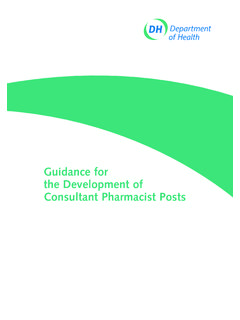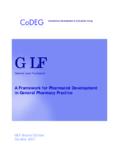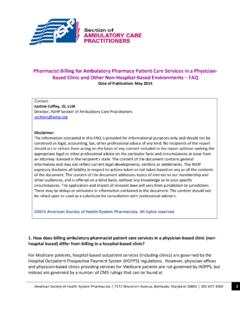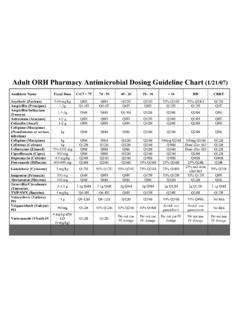Transcription of Adult Critical Care: Specialist Pharmacy Practice - CoDEG
1 New Ways of Working Adult Critical care : Specialist Pharmacy Practice New Ways of Working Adult Critical care Specialist Pharmacy Practice Page i of iii DH INFORMATION READER BOXP olicyEstatesHR / WorkforcePerformance ManagementIM & TPlanning FinanceClinicalPartnership WorkingDocument PurposeBest Practice GuidanceROCR Ref:0 Gateway Ref:5122 TitleAuthorPublication DateTarget AudienceCirculation ListDescriptionCross RefSuperseded DocsAction RequiredTimingContact DetailsFor Recipient's UseAdult Critical care - Secialist Pharmacy PracticeSE1 9BW00207 633 4047 Keith Young11/3 New King's Beam House22 Upper GroundLondon0DH N/A0N/A01 Jul 2005 Directors of Nursing, Directors of HR, Allied Health Professionals, Directors of PharmacyNHS Trust CEs, Foundation Trust CEs , Medical DirectorsThe Document describes guidance on the Practice , skills and experience needed by pharmacists wishing to specialise in the Adult Critical care area.
2 0N/A0N/ANew Ways of Working Adult Critical care Specialist Pharmacy Practice Page ii of iii Amendment History Version Date Comment By Approved 291004 Initial draft for discussion Keith Young 201104 Draft for Discussion Cath McKenzie 161204 Amended Cath McKenzie 190105 Amended Expert Panel 180205 Amended Cath McKenzie 250205 Amended Mark Borthwick 280205 Amended Rob Shulman 040505 Consultation Close Meeting Keith Young Cath McKenzie Mark Tomlin Mark Borthwick 080605 Final Draft Mark Borthwick New Ways of Working Adult Critical care Specialist Pharmacy Practice Page iii of iii List of Contributors This document has been produced by an expert group including key department of health (DH) personnel, Specialist Critical care pharmacists and senior NHS pharmacists.
3 These were: - Department of Health Keith Young (Chair) Emergency care Strategy Team John Farrell Office of the Chief Pharmacist Specialist Critical care Pharmacists Catherine McKenzie ( Pharmacy lead) London Mark Tomlin (Joint Pharmacy lead) Southampton Mark Borthwick (Editor) Oxford Ruth Forrest Glasgow Robert Shulman London Mark Craig London Robin Offord London Richard Bourne Sheffield Steve Bowden Cardiff Meera Thacker London Kate Price London Sarah Yassin London Julia Oxley Leicester John Dade Leeds Emma Graham-Clarke Birmingham Senior NHS Pharmacists Duncan McRobbie Principal Clinical Pharmacist, Guy s and NHS Foundation Trust David Webb Director of Clinical Pharmacy , Specialist Pharmacy Services, London, Eastern and South Eastern Graham Davies Director of Clinical Studies, University of Brighton Richard Cattell Director, South West Medicines Information and Training Tony West Chief Pharmacist, Guy s and St.
4 Thomas NHS Foundation Trust New Ways of Working Adult Critical care Specialist Pharmacy Practice Page 1 of 27 Table of Contents 1. INTRODUCTION ..2 2. PROJECT OBJECTIVES ..2 3. SCOPE OF THE PROJECT ..4 4. KEY ACTIVITIES ..4 5. CONCLUSIONS and SPECIFIC RECOMMENDATIONS ..5 6. RISKS ..5 7. 8. ANNEX 1: PROPOSED CAREER PATHWAYS IN Critical care 7 ANNEX 2: Specialist COMPETENCIES FOR CLINICAL Pharmacy Practice IN Critical 9 1. Expert Professional 2. Building Working 3. 4. 5. Education, Training and 6. Research and ANNEX 3: CORE CLINICAL KNOWLEDGE FOR ADVANCED Critical care 22 1. Central Nervous 2. Cardiovascular 3. Respiratory 4. Gastro-intestinal 5. Genito-urinary 6. 7. 8. 9. 10. ANNEX 4: ISSUES TO BE CONSIDERED BY 26 1. 2. 3. 4. 5. 6. 9. 10. REFERENCES ..27 New Ways of Working Adult Critical care Specialist Pharmacy Practice Page 2 of 27 1.
5 INTRODUCTION The purpose of this document is to describe the project to identify new ways of working in Critical care Pharmacy and to develop a career framework for pharmacists wishing to specialise in the care of critically ill patients. This document provides guidance on good Practice , skills and experience relevant to pharmacists who wish to specialise in Critical care areas and supports the new and emerging role of pharmacists in Critical care . It is recognised throughout that the medical consultant / intensivist working within the multi-disciplinary clinical team has responsibility for the clinical management of patients. However, within the team the pharmacist has a specific responsibility for the safe and appropriate use of medicines. There are a number of drivers that are coming together to encourage new ways of working by clinicians working in Critical care areas.
6 Those most pertinent to pharmacists include: - Ensuring that that patient s journey is safe when they are most vulnerable. Ensuring the most effective use of medicines to achieve best patient outcome. Changes in the way health care is delivered (including clinical governance, and evidence based medicine). The need to have recognised standards of Practice and develop better Critical care Practice . Changes in population demographics that alter the demands for healthcare and particularly Critical care interventions. The recognition that medicines and medicines management requires unique clinical expertise. Innovations in medicines that require expert interpretation and managed new entry of appropriate agents. A recognition of the increased complexity of medical management including risk management. An increasing recognition that healthcare professionals need to work in multidisciplinary teams with flexible professional boundaries in order to deliver the healthcare that is demanded.
7 Changes in the number and availability of medical practitioners (due to changes in terms and conditions arising from the European working time directive and the new consultant contract). The implementation of Agenda for Change and the implications that it has for recognising professional skills and knowledge. A recognition of the benefits of greater specialisation within traditional professional groups. The need to improve recruitment and retention in Specialist areas and maintain a skilled workforce. 2. PROJECT OBJECTIVES The primary aim of this work is to improve the outcome of critically ill patients by developing appropriate support for their care . This requires the delivery of high quality Pharmacy services. Pharmacists need to be trained within a recognised competency framework for the NHS. This work will also assist commissioners to identify and purchase high quality pharmaceutical care for critically ill patients and recognise the need for different levels of Practice , support in Practice and peer review over a defined area that would, ideally be a Critical care network (or equivalent).
8 New Ways of Working Adult Critical care Specialist Pharmacy Practice Page 3 of 27 The Project will deliver this by: - Helping define professional roles and responsibilities within Critical care Pharmacy and facilitate a greater sharing of expertise. Supporting the development of an agreed career path for pharmacists who wish to specialise in the Critical care area. This will provide pharmacists with a framework to identify educational training needs and the required skills necessary to Practice competently with critically ill patients. (A proposed possible career path is described in Annex 1). Describing the Specialist competencies that are required for Critical care Pharmacy Practice (Annex 2). Providing a structure for further professional role development and the adoption of new standards of working. Contributing to the development of a national template for consultant pharmacists.
9 This Project will support the delivery of the following commitments from the NHS Improvement Plan (published 24 June 2004): - Critical care services need to be available for seriously ill patients and need to be available where needed, when needed. Effective Critical care services need to be in place to ensure that operations are not unnecessarily cancelled and capacity and resources are maximised so that patients will be admitted for treatment within a maximum of 18 weeks from referral by their GP and that those with urgent conditions will be treated much faster. Assisted by the care Bundle approach, the quality of care provided in Critical care units will improve and contribute towards the commitment that in every care setting the quality of care will continue to improve, with the Healthcare Commission providing an independent assurance of standards, and patient safety being a top priority.
10 Critical care will, where necessary, support people with complex long-term conditions and the work of the new community clinical specialists . Both general and Specialist Critical care services will assist with the achievement of further progress in tackling the biggest killer diseases. Specialist cardiac Critical care units, renal units, neurology units and those supporting surgical care will help maintain falls on death rates from heart disease, stroke, cancer and other conditions. Critical care staff are already developing ways of working that cross professional and cultural boundaries. They will, wherever appropriate, continue to encourage more flexible ways that best responds to patient needs. To achieve these commitments, the core objective of the Project is to ensure the provision of Specialist Pharmacy expertise to the critically ill patient.





